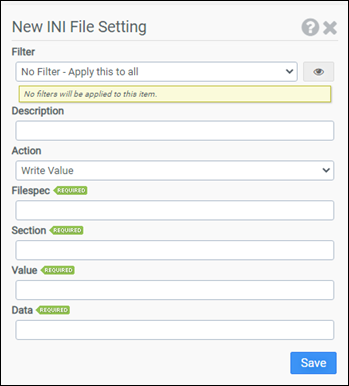Many programs rely on INI files for their configuration. This module enables ProfileUnity to manipulate INI files during user logon.

Here is the structure of an INI file.
|
[Section] Value=Data |
|---|
Filter
Select the name of the filter you want assigned to this configuration element. Click the Show Filter Details button on the right to review any filter settings without leaving Configuration Management.
Description
Enter a description for this rule.
Action
Select one of the following actions:
- Write Value: Modifies or creates a value and assigns data to it.
- Delete Value: Deletes a value and associated data.
- Delete Section: Deletes an entire section.
Filespec
Enter the full path to the INI file. If this parameter does not include a full path, ProfileUnity searches for the file in the Windows directory.
Section
Enter the name of the section to be modified in the INI file. If the section does not exist, it is created. The section name is not case-sensitive and can contain any combination of uppercase and lowercase letters.
Value
Enter the name of the value to be modified in the INI file. If the value does not exist, it is created. This option is not available if Delete Section is selected as the Action.
Data
Enter the data you want assigned to the value. This option is only available if Write Value is selected as the Action.
Example
This example demonstrates using the INI Files module to update Citrix Program Neighborhood settings. The HttpBrowserAddress for the application set named LIQUIDWARE will be set to ica.liquidware.com. The pn.ini file will have the changes made to it shown below.
- Filter: No Filter – Apply this to all
- Action: Write Value
- Filespec: %APPDATA%\ICAClient\pn.ini
- Section: LIQUIDWARE
- Value: HttpBrowserAddress
- Data: ica.liquidware.com
|
[LIQUIDWARE] HttpBrowserAddress=ica.liquidware.com |
|---|
Note: The APPDATA environment variable only exists by default on Windows XP or greater. You can use the Environment Vars module to set this variable on clients running other operating systems.
